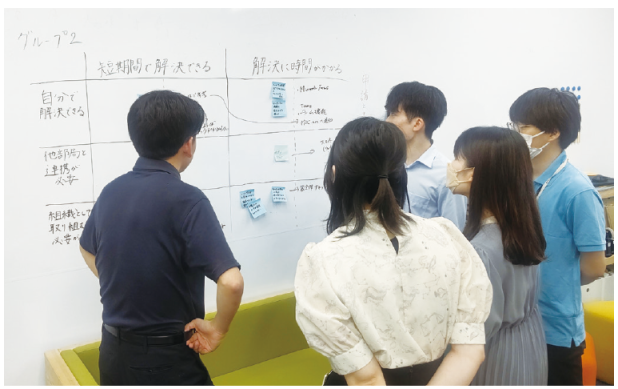The Minister’s Secretariat (MS) plays the role of “leading the ministry” by determining the way the ministry should be headed during the planning process, when making the policies of the MIC, and during the process of drafting bills.
The MS also oversees the entire MIC and coordinates administrative affairs within the ministry to ensure it is smoothly conducted to support the ministry.
The MIC oversees a wide range of policies that include the management and operation of Japan’s basic administrative structures, local government and fire defense/emergency administration, and the achievement of growth policies through the use of information and communication technology (ICT). For this, it is of the utmost importance that the MS plays a leading role in consolidating the responses of the MIC, conferring between government ministries and agencies, and coordinating within the ministry in the planning and drafting processes for various policies. For example, the MS expresses opinions on behalf of the MIC and plays a leading role in executing policies under its purview with regard to policy issues handled at important governmental meetings, including the Council on Economic and Fiscal Policy; the Headquarters for Creating a Society in which All Women Shine; the Advisory Council on Vitalizing Towns, People and Jobs; and the Council of New Form of Capitalism Realization.
In reflecting any planned and drafted policy on a specific law, likewise, the MS plays the “role of leading” the entire ministry in drafting bills and in tasks related to the Diet. More specifically, the MS conducts its examination: namely, it examines the huge quantities of official documents and bills drafted within the ministry to see whether they conform to its policies, whether the regulations match one another well and whether the expressions are appropriate, thereby checking all the details. Moreover, the MS serves as the contact for receiving consultations from other ministries and agencies regarding laws and, conversely, as the contact for the MIC when the latter wishes to consult with other ministries and agencies.
Furthermore, the MS also sponsors liaison meetings between the MS and each department or bureau to ensure smooth communication within the entire ministry. In so doing, the MS is in charge of the key points in the ministry’s decision-making.
The MS is in a position not only to lead but also to operate the whole of the ministry. By arranging and training the right personnel for the right positions, the MS builds an environment in which the personnel concerned can acquire an even higher education and work to develop their abilities and improve their welfare in a correct and lively manner. Another important role of the MS is to coordinate the organization of the entire MIC and the full number of personnel and to make budget requests for implementing the policies of the MIC, in order to ensure that the ministry is organized in a manner in line with the current times and environment.
The MIC is promoting DX at the ministry to coincide with the transition to a governmentwide task environment using the most advanced digital technology (government solution services). While ensuring security, the MIC is striving to realize a more worker-friendly task environment through such measures as introducing flexible working styles, including telework, and improving productivity by proactive utilization of digital tools.
Moreover, to ensure an efficient and higher-quality administration, the MS assesses the policies of the MIC and makes public relations efforts that provide clarity in order to deepen understanding of the policies of the MIC.
The MS also deals with matters related to expressing the commemoration of civilians killed in air raids during World War II. It also undertakes tasks taken over by the national government from the former Public Foundation for Peace and Consolation. This includes storing, managing and exhibiting invaluable materials on the hardships faced by former soldiers ineligible for Onkyu (pension for retired public officers under the former scheme) and those who experienced forced detention following the war, as well as people repatriated from overseas so as to ensure that those materials are passed down to future generations.
Aiming for a workplace for a variety of staff
The MIC, which has jurisdiction over the affairs concerning digitalization and the reform of the operations of national government agencies, advances working style reform by maximizing the utilization of digital technology.
In addition to striving to carry out working style reform in light of the voice of employees, Office for Work Style Reform and Work Review of the Secretarial Division of the MS supports the reform of the operations at individual departments and bureaus by holding training sessions, seminars and workshops regarding the reform.
The MS will continue its activities so that all employees can work in ways that deliver results as an organization while growing themselves and feeling a sense of fulfilment by fully demonstrating their abilities in accordance with their various background circumstances, including child care and family care.

A workshop